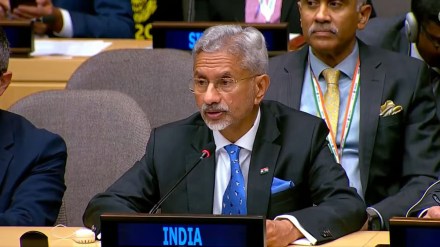External Affairs Minister S Jaishankar on Thursday said that terrorism continues to be a “persistent threat” to development and must not be tolerated or accepted in any form. He was speaking at the Second G20 Foreign Ministers’ Meeting in New York on Thursday where he urged countries to stand united against terrorism.
“A persistent threat to development is that perennial disruptor of peace – terrorism. It is imperative that the world display neither tolerance nor accommodation to terrorist activities. Given the extensive networking amongst terrorists, those who act against them on any front actually render a larger service to the international community as a whole,” Jaishankar said without poiting out Pakistan.
The Minister also underlined the failures of current global institutions like the United Nations, pointing out that they have not been effective in dealing with today’s challenges such as conflict, economic stress, and terrorism. “The need for reforming multilateralism has never been greater,” he said.
Jaishankar further reminded the G20 that it has a special responsibility to stabilise the world in times of political and economic turbulence. He said that this could be achieved via dialogue, diplomacy, stronger action against terrorism, and by focusing on energy and economic security.
India’s firm stand after the Pahalgam attack
His remarks came just two months after the April 22 terror attack in Jammu and Kashmir’s Pahalgam, where 26 people, including one Nepalese national, were killed. Jaishankar described the attack as an act of warfare designed to destroy Kashmir’s tourism, which is central to its economy, and to provoke religious violence. He said India could not allow such acts to go unanswered.
Following the attack, India carried out targeted strikes on terrorist infrastructure in Pakistan and Pakistan-occupied Kashmir, killing over 100 terrorists linked to groups such as Jaish-e-Mohammed, Lashkar-e-Taiba, and Hizbul Mujahideen. Soon after, India also suspended the Indus Waters Treaty, shut down the Attari land border crossing, and downgraded diplomatic ties with Pakistan.
Rejecting terror as proxy warfare
Jaishankar highlighted that for decades, terrorists had operated openly from Pakistan, with well-known headquarters in its towns. He said that India has now made it clear that terrorists will no longer enjoy impunity or be treated as proxies while the governments that support and finance them go unpunished.
He recalled how India has suffered from terrorism since independence, with intensified violence over the past four decades. He referred to major attacks like the 2001 Parliament attack and the 2008 Mumbai attacks, where terrorists attempted to take lawmakers hostage and brought an international city to a standstill. He said the repeated attacks have led to growing determination in India that terrorism will no longer be allowed to continue unchecked.
No yielding to nuclear blackmail
Jaishankar also made it clear that India will not be restrained by nuclear threats from across the border.
“We will not allow nuclear blackmail to prevent us from responding because we’ve also heard this for too long that you know you are both nuclear countries therefore the other guy will come and do horrible things but you mustn’t do anything because it gets the world worried. Now we’re not going to fall for that you know if he’s going to come and do things we are going to go there and also you know hit the people who did this. So, no yielding to nuclear blackmail, no impunity to terrorists, no more free pass that they are proxies and we will do what we have to do to defend our people,” Jaishankar said.
Jaishankar stressed that terrorism is not only a problem for India but for the entire world. He said no country should use terrorism to advance its policies because it eventually turns against those who support it. For him, the message is simple: terrorism must be met with zero tolerance, with no excuse, justification, or free pass.
